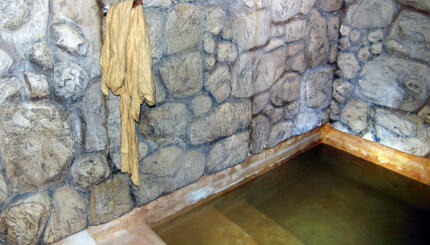I am what you might call an alternative peace activist. The return to the biblical heartland of Israel — Judea and Samaria (the West Bank) — where Abraham spoke with God and where King David ruled, is a value that animates my being. This modern-day miracle is the fulfillment of the dreams of our forefathers. But I also hear the echoes of the biblical prophets in my ear, crying out for righteousness and justice for all. I cannot abide the lack of rights and the loss of dignity that the Palestinians suffer daily. I witness it directly and hear about it in the first person, and it tears me up inside.
I identity with the right, and I identity with the left. You cannot easily label me.
And it is not only me. Hundreds of settlers in the Gush Etzion area have gathered around our new movement: Roots/Shorashim/Judur – a local Israeli-Palestinian initiative for understanding, nonviolence and transformation. We are challenging people to remove the blinders from their eyes, to see the other side and recognize his humanity and his story. Without abandoning our own truth, we are learning to see the other’s truth as well.
Many Palestinians have also joined our efforts. They also are learning to change their perception of the other and to recognize our truth. But there are not enough of them. A tipping point seems almost to have been reached. We are on the verge of recruiting thousands of settlers for our dialogue activities, but it is not clear if we will have enough Palestinians for them to talk to.
There are many reasons for this. So many Palestinians are in dire economic straits. They cannot find the time or strength to engage in dialogue while they are barely able to put food on the table for their families. I get that.
But there is also the culture of victimhood, the sense that it is all the fault of the other side and it is only the other side’s responsibility to fix this mess. Too many Palestinians are waiting for the other side to take the initiative. I get that as well; many Israelis feel the same way. But as long as both sides continue to see themselves only as victims of the other, we will remain mired in this conflict for decades to come. Palestinians, just like Israelis, must take responsibility.
But perhaps our worst enemy is the anti-normalization movement. Palestinians believe that they assert their human dignity by refusing to normalize relations with us. They have a deep sense that talking to the enemy would grant him legitimacy. Yes I get it, but it does not help move us forward. It’s counterproductive.
For so many Israelis, the Palestinians just don’t exist as human beings. They are part of the drab grey landscape. They are not alive as real human characters in the story. What can crack open the window of our souls to allow us to see them as human beings is human contact. When we talk together and show each other a human face, when we create circles of interaction and dialogue, the barriers begin to fall. When we hear the other’s story, we can begin to internalize it. That is the point at which transformation starts to occur. This will pave the road towards reconciliation and a solution to this conflict.
I say to the Palestinians that the anti-normalization movement is actually entrenching the occupation. It allows each side’s ugly stereotypes of the other to fester and grow unhindered; the way to undermine the occupation is for each side to show the other its human face.
When ignorance and enmity give way to understanding and empathy, there will be hope for peace and justice. There is no other way.
(Photo courtesy of Bruce Shaffer)



